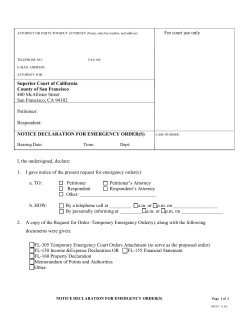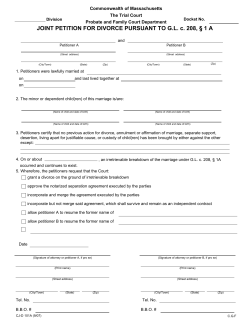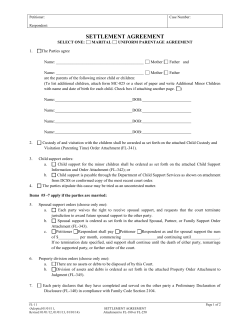
* IN THE HIGH COURT OF DELHI AT NEW DELHI + W.P.(C) No
* IN THE HIGH COURT OF DELHI AT NEW DELHI + W.P.(C) No.7367/2014 19th March, 2015 % SHRI CHAND AGGARWAL Through: ..... Petitioner Mr. Rajiv Bakshi, Advocate. versus SMARTH SHIKSHA SAMITI & ORS. ..... Respondents Through: Mr. Puneet Taneja, Advocate with Mr. Sheel Vardhan, Advocate for respondent Nos.1 and 2. Ms. Purnima Maheshwari, Advocate for respondent No.3. CORAM: HON’BLE MR. JUSTICE VALMIKI J.MEHTA To be referred to the Reporter or not? VALMIKI J. MEHTA, J (ORAL) 1. The limited relief which is prayed before this Court by the petitioner is that the petitioner who ordinarily retires on 30.11.2014, should be retired not on this date but should be retired only at the end of the academic session on 30.4.2015, and as provided under Rule 110 of the Delhi School Education Rules, 1973 (hereinafter referred to as ‘the Rules’). 2. The issue argued on behalf of the petitioner is covered in favour of the petitioner by the judgment delivered by this Court in the case of W.P.(C) No.7367/2014 Page 1 of 5 Nutan Gulati Vs. Director of Education and Ors. in W.P.(C) No.109/2013 decided on 9.7.2013. Relevant paras of this judgment are paras 3,7 and 8 and which read as under:“3. So far as the relief of employment up to 30.4.2013 is concerned, it would be necessary at this stage to reproduce Rule 110 with its sub-Rule 2 and proviso. Rule 110 reads as under:“110. Retirement age.-(1) Except where an existing employee is entitled to have a higher age of retirement, every employee of a recognised private school, whether aided or not, shall hold office until he attains the age of 58 years: Provided that the managing committee may grant extension to a teacher for a period not exceeding two years in the aggregate, if in the opinion of the managing committee such teacher is fit for such extension and has no mortal or physical incapacity which would disentitle him to get such extension: Provided further that no such extension shall be granted in the case of a teacher of an aided school except with the previous approval of the Director. (2) Notwithstanding anything contained in sub-rule(1), every teacher, laboratory assistant, Librarians, Principal or VicePrincipal employed in such school shall continue to hold office until he attains the age of 60 years. Provided that where a teacher, Principal or Vice-Principal attains the age of superannuation on or after the 1 st day of November of any year, such teacher, Principal or VicePrincipal shall be re-employed upto the 30th day of April of the year immediately following.” xxxxxxx 7. In my opinion, the argument urged on behalf of the petitioner merits acceptance and I do not agree with the argument urged on behalf of respondent no.2-school for the reason that so far as the W.P.(C) No.7367/2014 Page 2 of 5 applicability of Section 10(1) is concerned, the same quite clearly and categorically as per its literal interpretation gives whatever benefits are available to employees of Government schools would also be available to teachers/employees of unaided private schools in Delhi. Section 10(1) does not restrict benefits only to salary/monetary benefits as the expression used in Section 10(1) is “other prescribed benefits”. Respondent no.2 is unaided private school in Delhi and therefore, it is bound by the provision of Section 10(1) to give benefits to its teachers which are those as granted to teachers of the Government schools. Since in Government schools as per circular of Director of Education dated 21.1.2011 librarians are to have all benefits applicable to teachers in teaching category, the petitioner who is a librarian will also get all benefits as those granted to a teacher in an unaided private schools. The argument of the respondent no.2 on the basis of the expression “Administrator” as found in Section 2(e) (ii) of the Delhi School Education Act and Rules, 1973 is misconceived because the expression “Administrator” is used in this provision with respect to the authority which runs/owns the school and not with respect to issuance of circulars for being applicable to schools, and which is the prerogative of the Director of Education/authority which governs the school under the provisions of the Delhi School Education Act and Rules, 1973. 8. In view of the above, the writ petition is allowed and it is directed that respondent no.2-school will consider the re-employment of the petitioner in terms of the ratio of the judgment in the case of Shashi Kohli (supra). Petitioner however, will be given all benefits as if she continued in employment till 30.4.2013. Unpaid dues of the petitioner be now paid in four weeks. Parties are left to bear their own costs.” 3. I am bound by the judgment in the case of Nutan Gulati (supra) and therefore the writ petition will have to be allowed. 4. Learned counsel for the respondent nos.1 and 2 argues that the provisions of Rule 110 of the Rules will not prevent the School from terminating the employment of an employee even before the academic year W.P.(C) No.7367/2014 Page 3 of 5 ends once the employer has enough staff at its disposal for performing the duties which were performed by the retired employee, however, I note that in the provision of Rule 110 of the Rules there is no such exception provided by which a school is entitled not to continue the employee/teacher till the end of the academic year on the ground that other staff is available to the school for performing the duties of the employee who retires within the academic year after 1st November. If I accept the argument urged on behalf of respondent nos.1 and 2 that would mean that I would be legislating and modifying the specific language of Rule 110 of the Rules which does not contain any exception or proviso of the language, as is argued on behalf of respondent nos.1 and 2. 5. In view of the above, the writ petition is allowed and petitioner is held not to superannuate on 30.11.2014 but on 30.4.2015, however, petitioner for this period from 1.12.2014 till 30.4.2015 so far as monetary reliefs are concerned, he will only get 2/3rd of the monthly salary and connected payments inasmuch as every employee who works does not take home the entire pay inasmuch as some amount of pay is spent for earning the monetary emoluments. Equity therefore demands that respondent nos.1 and 2 be only directed to pay 2/3rd of the salary and other connected monetary emoluments from 1.12.2014 till 30.4.2015. It is also made clear W.P.(C) No.7367/2014 Page 4 of 5 that petitioner will return for working with the respondent no.2/School within a period of two days from today and respondent no.2/ School will give appropriate duties to the petitioner as the respondent no.2/School thinks fit. VALMIKI J. MEHTA, J MARCH 19, 2015 KA W.P.(C) No.7367/2014 Page 5 of 5
© Copyright 2024





















